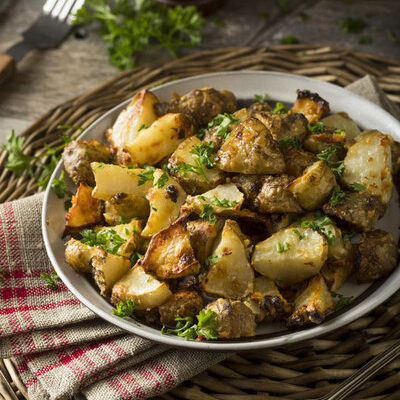
Jerusalem Artichoke
What is a Jerusalem Artichoke?
The Jerusalem artichoke is a kind of root vegetable that belongs to the sunflower family. It is also known as sunchoke. Jerusalem artichokes did not originate in Jerusalem nor are they artichokes.
- One common theory about the origin of this food’s name is that it came from the Italian phrase “girasole articiocco”, which means sunflower artichoke.
- The “Jerusalem” part of the name is likely a mispronunciation of the word “girasole.”
Seven varieties of this vegetable include:
- Stampede
- Red Fuseau
- White Fuseau
- Red rover
- Clearwater
- Waldspine
- Flowering Helianthus Tuberosus
Origin of Jerusalem artichokes
This food originated in North America and Canada. Native Americans were the first people to plant and cook Jerusalem artichokes. They even used it to trade between tribes and peoples. This is one of the reasons why this plant is common in North America. The Europeans who explored the North American continent brought this food to Europe.
In 1616, Samuel de Champlain took this vegetable back to France, where it flourished. In the middle of the 16th century, people ate this food and used it to feed animals. The common names that the French gave this food were artichauts de Canada (Canadian artichokes) or poires de terre (earth pears).
Function
The sunchoke plant can serve various purposes in the kitchen. For instance, the tuber can be made into flour for people who suffer from gluten intolerance. Jerusalem artichokes are also commonly used in creating pickles and relishes. Not to mention, sunchokes are used in the industrial production of certain types of brandy.
Nutrition
A serving of 100g of raw Jerusalem artichokes contains:

This vegetable can provide several health benefits. Here are some of them:
- This food is capable of lowering high cholesterol levels.
- The fiber in this vegetable can lower blood pressure as it improves the performance of insulin.
- This food may also help with digestive problems due to its fiber content.
- It contains essential vitamins that can boost the immune system.
- This food can even assist in blood cell production.
Commercial production
Jerusalem artichoke can germinate on almost any kind of soil with tubers beginning to germinate in two to three weeks. However, this vegetable grows best on well-drained and loose soil. Neutral soil is suitable for this plant, although slightly alkaline soil would be better. Watering is also essential for this crop. This plant grows as high as 6.5 to 8 feet.
Application
It’s best to store Jerusalem artichokes in a cool, dry place. This way, they will last for up to ten days. When you are cutting this tuber, note that it loses its color quickly when exposed to air. Therefore, when you are peeling this vegetable, place it in a bowl filled with cold water, and add a squeeze of lemon juice to the water.
When you buy these tubers, be sure to get the ones with few knobs. This will reduce the time you will spend peeling. Choose tubers that are firm and fresh, without wrinkles.
Jerusalem artichoke recipes
This tuber lends itself to a variety of dishes. Here are some popular recipes:
- Roasted Jerusalem Artichoke
- Salad of Shaved Artichoke and Sunchokes
- Roasted Sunchokes with Salsa Verde
- Creamy Ginger Scalloped Sunchokes
- Roast Jerusalem Artichokes
FDA regulation
The Food and Drug Administration classifies Jerusalem artichoke as a raw agricultural commodity. The body regulates the growing, harvesting, and packing of this food. In 1988, the FDA issued a notice to clarify the difference between Jerusalem artichoke and globe artichoke. The organization defines this vegetable as the common or usual name for the tuber (Helianthus tuberosus).
References
Krish, Tangella. “7 Health Benefits of Jerusalem Artichoke.” www.dovemed.com, Dovemed blog, 11 Aug. 2014, www.dovemed.com/healthy-living/natural-health/7-health-benefits-of-jerusalem-artichoke/.
“CFR – Code of Federal Regulations Title 21.” accessdata.fda.gov, U.S Food & Drug Administration, 1 Apr. 2019, www.accessdata.fda.gov/scripts/cdrh/cfdocs/cfcfr/CFRSearch.cfm?fr=112.1.
